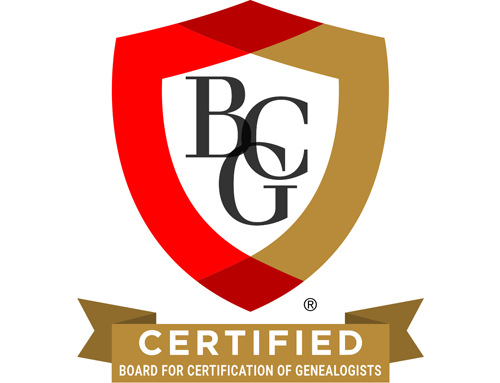SpringBoard is pleased to present a series by associates writing about their path to certification. These posts spotlight the many ways to reach that goal and provide encouragement and ideas for anyone considering their own roadmap to becoming a Certified Genealogist. Elyse Hill, CG®, became Associate #1120 on 19 November 2019. Her story follows in her own words.
I live in McDonough, Georgia outside of Atlanta, and work as a Program Analyst for the Federal Government. My ancestors are primarily from Mississippi and Tennessee, and my interest in genealogy began with a desire to learn about my maternal ancestors since that was the side of the family I knew the least about.
I discovered that my third great-grandfather Alex Porter had filed for a Civil War confederate pension from the state of Tennessee in the 1930s. Further researching both Alex and the document, I learned that during the war he was a body servant to his master Dr. Josiah Porter. Josiah was a Confederate officer, medical doctor, and the brother of James D. Porter, a former Tennessee governor. Alex was awarded his pension of $10/month in 1921, 56 years after the war ended. The findings and history lessons I learned from that research started my passion for genealogy research.
Getting Started
When I initially considered certification, I knew I had to increase my knowledge base as well as my exposure to a variety of research techniques and documents. I started attending national conferences as well as IGHR and GRIP. To use the research skills I learned, I “adopted” various people, events, and places to conduct research on.
Once I had an inventory of good research candidates for certification, I began reading the BCG standards and requirements and made my selections for each portion of the portfolio. I soon realized I needed more training so prior to applying I did lots of reading, took classes, and listened to webinars related to methodology, sources, proof, case studies, and citations.
Challenges
My biggest challenge was a tendency to second guess my writing skills, leading to lots of rewriting. Other challenges were numbering family members in the KDP (Kinship Determination Project), articulating proof arguments, and creating citations when I had never done this to BCG standards. After completing and submitting my portfolio, I made the mistake of relooking at it several times. With each review I convinced myself that I made it, only to reverse course and decide that I didn’t make it! This back and forth went on for about a month and mentally exhausted me. I was notified that I was successful a week after my birthday and about a month before Christmas. That notification was the best gift I received that year.
Advice
My advice to those seeking certification is before you officially apply, make sure you read and fully understand the BCG Application Guide as well as the standards and rubrics your work will be judged against. Do an honest self-assessment of your research knowledge, skills, and work. Acknowledge your deficiencies and seek out training, webinars, books, articles, and research projects that specifically address and remedy your weaknesses. Be confident and able to prove to yourself you are ready to apply for certification. Do most of your training and research work prior to officially applying. And don’t relook at your portfolio once you’ve submitted!
I’m usually doing something genealogy related every day. Currently, I am working with the University of Georgia on their History of Slavery project, revising my portfolio’s case study and KDP for potential NGSQ articles, and still researching my “adoptees”. The entire certification process has given me a greater awareness of what thorough research requires. I’m proud and honored to be part of a group of great researchers who hold the CG® credential.
Sincere thanks to Elyse Hill, CG® for sharing her story.
The words Certified Genealogist and letters CG are registered certification marks, and the designations CGL and Certified Genealogical Lecturer are service marks of the Board for Certification of Genealogists®, used under license by board certificants after periodic evaluation.

